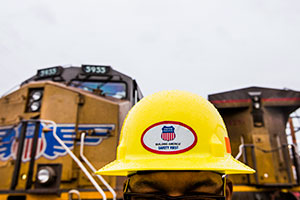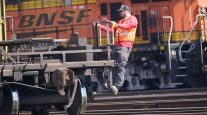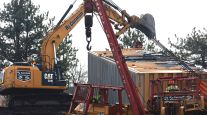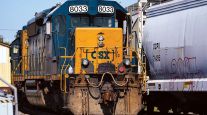Union Pacific Profit Tops Estimates on Cost Cuts as Cargo Drops

Union Pacific Corp. reported profit that beat analysts’ estimates after cutting costs as the railroad heads for its first annual drop in sales since the recession in 2009.
Earnings of $1.50 a share beat the $1.43 average of 26 analysts’ projections compiled by Bloomberg News. Revenue fell 10% to $5.56 billion, trailing the average estimate of $5.64 billion.
Slumping demand for coal, crude oil and metals damped quarterly U.S. rail-shipment volumes by 1.6%, according to Association of American Railroads data. The biggest decline came at Union Pacific, which also lost market share to BNSF Railway Co. taken a year earlier while BNSF struggled with service.
Lance Fritz, who became CEO in February, has escalated efforts to cut expenses as the slump in industrywide carloads outstrips rail companies’ projections made earlier this year. Union Pacific, the largest publicly traded railroad, said in a Sept. 17 investor conference that it has furloughed 2,300 workers and parked 900 locomotives.
“Service has improved so they’re going to be taking costs out through the quarter and into 2016,” Ben Hartford, a Robert W. Baird & Co. analyst, said in an Oct. 19 interview. “They’re getting in front of” the dwindling volumes.
Operating ratio, a measure of expenses compared with sales, was the best ever, at 60.3%, Union Pacific said. That was 2 percentage points less than the year-earlier.
One of the few bright spots was auto shipments, where the four largest U.S. railroads posted gains. The decline in coal cargo has hurt railroads the most because it makes up about 19% of rail traffic and fetches among the highest prices per carload. Coal isn’t poised for a comeback because of low prices, and environmental regulations have prodded utilities to switch to cleaner-burning natural gas.
Union Pacific’s stock dropped 22% this year through Oct. 21, pointing toward the first annual decline since 2008.
The shares reflect concern that manufacturing weakness will drag on rail cargo, Hartford said. U.S. industrial production fell in August and September as oil investment dropped and the strong dollar crimped exports.
“U.S. industrial production expectations have fallen through the year, and there’s still some uncertainty about ’16,” Hartford said. “That can be an overhang for Union Pacific.”




